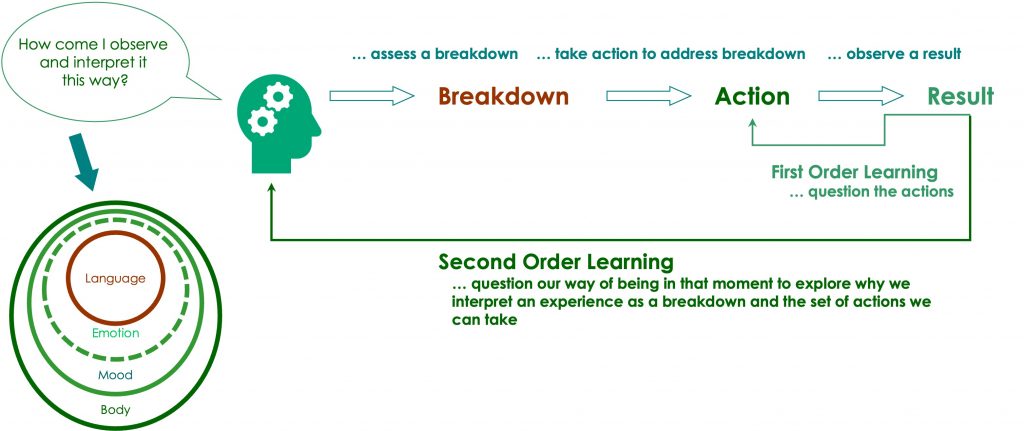
In this work, learning is a distinction we make in language. It is an assessment made of someone’s or something’s change in capacity to generate effective action. As an assessment lives with the observer, the extent of someone’s learning may vary from person to person. Furthermore, as we are seeing a change in capacity it also follows learning must be based in time.
To quote Rafael Echeverria, “Learning is an assessment made by an observer, based on observations that someone or something is able to do something that they were not able to do before.”
Gaining knowledge that is never used is not seen as effective learning. That requires translating those new ideas into new ways of thinking or acting.
Learning can be seen as a simple process that begins with some sort of action. That action will lead to some outcomes which are assessed. We then associate the action with our assessment of the outcome.
If the assessment is a positive one, we will most likely repeat the action in a similar situation. If the assessment is a negative one, then we will find ourselves in breakdown and we will be less likely to repeat what we have done. For instance, if I put our hand on a hot surface, the outcome is pain and, almost certainly, I will not knowingly do the same thing again. This simple process of learning is termed ‘first order learning’ and is the basis of standard problem solving techniques.
If we look for it, there can be more to learning than just assessing our actions and outcomes. We always act to address our breakdowns in the context of our concerns related to our way of being in that moment. What we see as possible actions are limited by our interpretation of the breakdown.
This opens up another possible level of learning, ‘second order learning’, which involves examining our way of being in that moment.

Examining our way of being also calls into question our interpretation of the breakdown and opens the possibility of new interpretations of the breakdown providing us with new possible actions and learning.
Consider this example. I am the owner of a company that is not performing as expected. If I believe our sales are down because of a poor marketing campaign, then the possible actions I see will be focused on marketing. My interpretation of the situation limits me. Should I bring in a consultant to help me with improving my sales, they may well challenge my assessment that the breakdown is caused by the marketing campaign. If they can provide strong evidence other factors contributed to the poor sales then I may change my story about what is happening. This would open up a new space of possibilities and lead to different actions and a different result. Through conversations with the consultant, I have learnt to observe more factors that affect sales and this has expanded my possible range of actions. I have new distinctions and have become a different observer. My possible ways of being have shifted.
We do not always require other people to help us to redefine our breakdowns. When dealing with a breakdown we can also examine our own way of being at the time and see what opportunities that presents. This lends itself to a self-coaching approach where we might consider how we are observing and interpreting the situation and how this could be limiting our ability to effectively resolve the breakdown. In doing this, we can explore all three domains of our being – language, emotion and body.
Let’s go back to the sales example. Say I believe I have am not responsible for poor sales and become angry every time that possibility is raised. By taking this stance, I may well be neglecting a key contributor to what is going on – me! I could reflect on why I feel this way and, indeed, what concerns I am addressing by blaming others. There would be little doubt that as the owner of the company, I would have a significant impact on its culture and its strategy and operations. My anger probably points to a defensive stance in regard to identity and reputation. It would seem it is easy to blame marketing rather than challenge my own self-story. This may lead to opportunities to not only find better solutions to our sales situation but also my leadership approach and its impact on the organisational culture.
Second order learning is a powerful way of fostering personal growth. We can learn to do this through a self-coaching approach but that is also limited to our own perspective. We can also engage someone to help us with our development and thereby gain insights from their worldview.